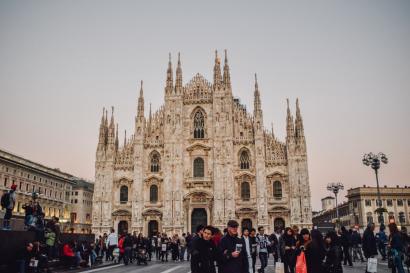
- Research about the city and know more than the touristic center
I can not be happier when I find out this incredibly valuable article that truly captures the essence of Milan. It helps me navigate the city and pull out the most intriguing, local spots immediately, in which some places that many expats in Milan would not even think of. Doing some research about the city you are going is definitely the key to a happy new start in a new environment, since you will start seeing the best of the best, while others have probably still being confused by the currency change.
2. Take it easy
No matter where we are, in our home university or anywhere around the world, the biggest problem facing us 20-something is purely peer pressure. Yes, you will find the competition out there once you start your first day of class. Ambitious youths compete against each other on how many new cities they have visited so far, how many European capitals that they have taken a stroll through, and perhaps how many new friends they have made. Studying abroad is not playing the statistic game that we have already tired of in school, it is rather a new chapter in our life that we can choose to be the best version of ourselves. Why not enjoy it? Take your time, learn to cook the local cuisine, sip in a local speciality tea or drink, and marvel at the fall color in an exotic country.
3. Go Off the Beaten Path
Milan is much more than fifty shades of gray, a funny term that general Italians refer to their country's industrial city. The city's hidden gems never cease to amaze me. Every neighborhood has a particular but equally charming vibe, either luxurious-chic, alternative-hip, or down-to-earth humbleness. Navigli, my favorite neighborhood in Milan, has the cutest cafes in town and some hidden mysteries that only the local history experts know. It used to be a working-class canal neighborhood where all poor ladies wash laundries for rich families; it used to be the inspirational studio of Milan's legendary artist Leonardo Da Vinci; it used to be an artist bottega where pupils sit by the canal from sunrise to sunset to draw people from lives. Learning the history of your city's neighborhoods not only strengthens your understanding of the culture, but also makes you much more an interesting guide when your family or friends come visit you.
4. Most importantly, embrace what you have!
It's not that uncommon to hear complaints about a new, gigantic city from some abroad students. Depending on your own capacity to adapt to a radically different environment, moving to a new country is a personal revolution that will probably trigger resistance! What you need to do is simply to relax - and you'd be better to do it the local way. Take my city Milan as an example, relaxation means a "cafe" (italian expresso) in the afternoon, an aperitivo from the rooftop bar with views of Duomo, a stroll through the fashion district, a people-watching game at the chic crowd.

Jiaqi Luo
<p>Fluent in Mandarin Chinese, Cantonese, Spanish, English and currently perfecting her Italian, it's clear why Jiaqi chooses her next adventure in the dynamic capital of Milan! An art lover and a free spirit, Jiaqi is now majoring in Art History and Latin American Studies at the University of Richmond. During high school, a month of staying with a host family in Helsinki, Finland opened the doors to a world of exotic saunas, lake kayaking, and inspired her wanderlust. A self-proclaimed travel sensualist, her favorite way of seeing the world is experiencing the culture through its people: she's volunteered in rural Nepal, conducted Holocaust research in Poland, and has lived with seniors in Spain.</p>








